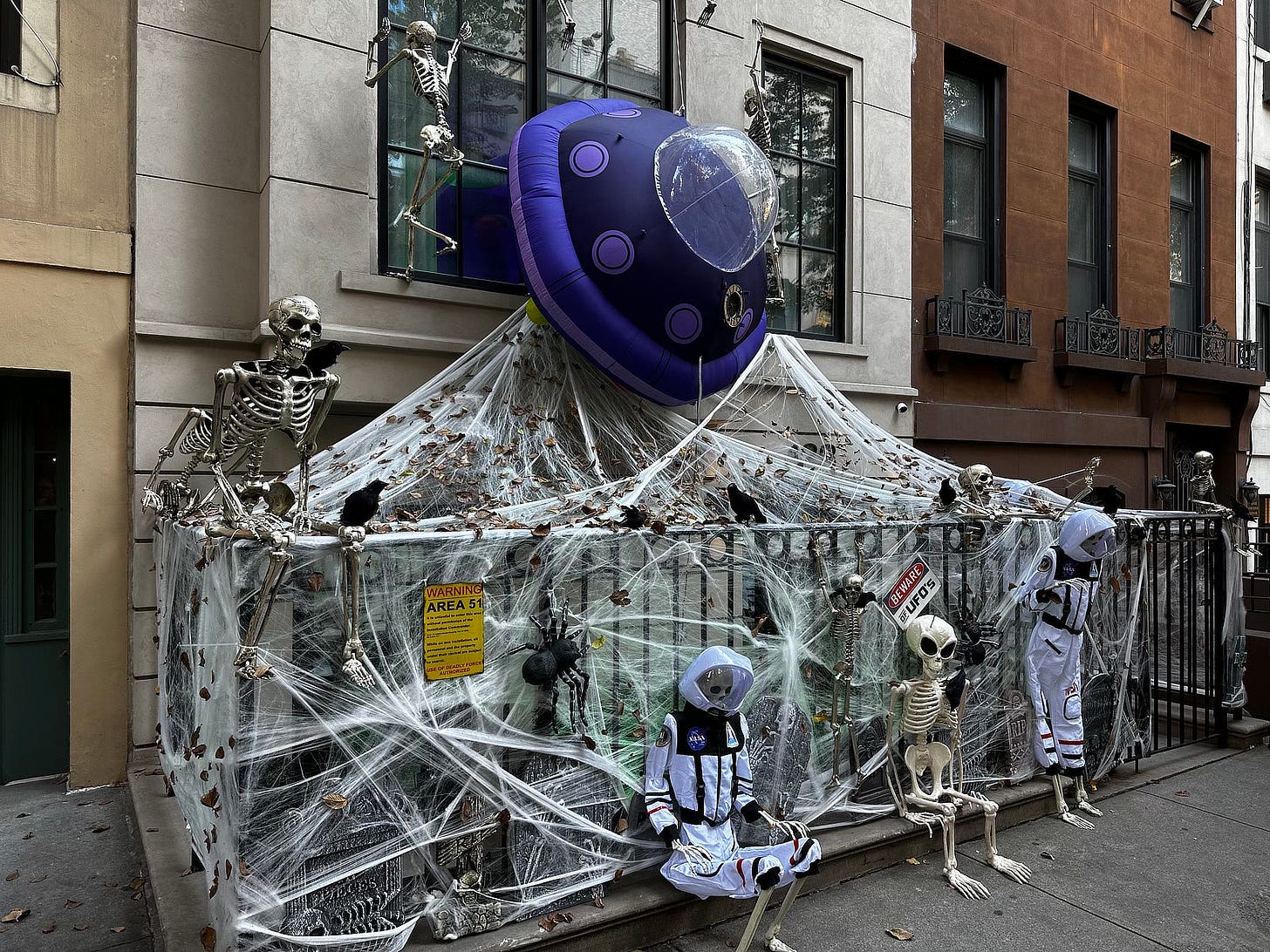Things are bound to get a little weird around here as we’re on final approach to Halloween. With that in mind, I thought I’d share what Michael sent earlier this week before we slide into the questions. You may as well queue up some Brian Eno to set the mood.
We were in NYC to see my eye doctor and came across the UFO scene in the upper East 60s where her office is. Everyone passing by had to stop, gawk, and take pix.
Shane Patrick White: In the past, how did you deal with any changes to a painting? I know if an editor or art director is on their game there shouldn't be any substantial changes. But before the days of the internet, how did the editor/AD weigh in on your process if at all?
MRW: Well, one tries to avoid changes by giving the AD as good an idea of your intentions as possible. It’s worth doing a detailed comp if it saves one from surprising the AD with elements that he/she didn’t anticipate at the start.
Some of my favorite paintings were improved greatly by an art director’s comments. On the other hand, some of my least favorite ones were ruined [in my humble opinion] by AD foolishness. It goes both ways.
If, in spite of okaying a detailed comp, the publisher insists on changes after okaying the preliminary image, then my meter starts running: I charge by the hour whatever it takes to make the changes required…and it’s gonna cost ‘em.
Ultimately, if I feel a publisher is requiring me to do work that makes me look bad I refuse to take any further work from them. It doesn’t help one’s career to do inferior work and get it published, if that can be avoided. I’ve walked away from assignments that I knew would be a problem in that regard.
I even turned down an offer to do The Lord of the Rings book covers, because they wanted the work in an insanely short amount of time. I knew I’d blow it—and it would kill me to see anything less than my best work done for my favorite fantasy novels ever.
Knowing when to walk is an essential asset.
Adam DeLaVergne: I remember reading somewhere before that you enjoy listening to audiobooks while you work, particularly The Dark Tower and The Lord of the Rings. What have you been enjoying recently and what are some other favorites that have stood out over your career?
MRW: Ah, audiobooks! I’ve been an avid listener for decades. When I learned that Norman Rockwell hired people to sit in his studio and read to him while he painted, I realized that he would have loved having audiobooks as a resource, had he lived long enough.
Nowadays, of course, we are spared the necessity because the audiobook “industry” has grown so much since the 1970s. Aside from the sheer volume of available titles to choose from, the quality of the narrators is phenomenal. I own quite a few audiobooks in various formats, sheerly because the readings are so great that they are literally music to my ears.

My personal selections vary quite a bit, reflecting my interests: history, biography, self-help books, but especially fiction in the genres of Fantasy, Science Fiction, Mysteries, Horror and True Crime. Naturally I have everything available by authors such as Stephen King, whom I have been associated with over the years.
This being October, currently the books I’m absorbing this month are Robert Bloch’s Psycho, a collection of short stories by Richard Matheson, King’s Salem’s Lot, and The Exorcist.
All these books are great, of course. Oh, and I’m saving a full-cast reading of Dracula for next week. I know that one will be wonderful also.

For me The Exorcist, read by the author, is THE standout. It is a chilling experience! He read it twice, the first time Blatty read the original published novel upon which the film was based. Years later upon the publication of his “40th anniversary edition” of the same title—which contains some edits and rephrased sections expanding upon the original book—he read it again. It’s interesting to compare the two. He read them both masterfully, doing an extremely impressive job with every character—emphatically including Lt. Kinderman and the demon Pazuzu.
The first version had some mood music, which was unaccountably left out of the second reading. Truth be told, I’m more of a fan of the first version, though I realize it’s probably because that was the first one I heard and I can’t listen to the second one without noting the slight changes between the two. But in both cases, his reading is amazing.

Ron McLarty’s reading of Salem’s Lot is a marvel. His voicing of Barlow, Straker, and other characters is perfection to my ears.
Anyway, other audiobooks that I listen to seasonally include the Tolkien fantasy classics, which always seem best suited to September for me. In the summertime I find myself returning to Stephen King’s Hearts in Atlantis and Herman Hesse’s Siddhartha.

Most other choices are not seasonally dictated, but still obviously influenced by contemporary events. So, over the last couple of years I’ve listened to every William Shirer history I could get my hands on, finding much relevance in his The Rise and Fall of The Third Reich and his Berlin Diary…which I feel should be required reading in every history class in our country.
I’m also a big fan of Antony Beevor and Max Hastings. Their books about WWII and subsequent conflicts are terrific. Max Hasting's history of the Cuban Missile Crisis and the Vietnam War were eye opening and, I must say, scary as hell when one realizes how differently things could have gone.
Beevor’s Stalingrad is exceptional, and I find myself returning to it often. (I’m a fan of any history detailing the Nazi army getting it’s ass handed to it.)

I’m a huge fan of Barbara Tuchman also, and have read or listened to every published work of hers. Her masterful The March of Folly should be required reading in every history class as well!!
And the winner is…

Our randomly selected winner for the UNMASKED print giveaway was Burt Smith. Congrats on winning our first art giveaway here on Substack!
Thanks to everyone who sent in questions. A few of them really hit the mark and prompted deeper reflection. Those topics include the influence of painting instructors at San Jose State University and the support of comic legend Neal Adams early in Michael’s career.
Keep sending in those questions or drop them here in the comments!
Weekly Art Recap






Robots and Empire - cover for Isaac Asimov
Lumen 5.1 - a play on the artist’s sigil to catch your eye
Hecate’s Cauldron - cover for a DAW horror anthology
The Gloaming - inspired by mysteriously lit clouds one summer evening
Periwinkle - cover for The Changeling Sea by Patricia A. McKillip
Marten Broadcloak - Dark Tower “remarque” accompanying Knowing Darkness
Like what you see? Subscribe!
We’re posting art every day on Substack. Don’t want to miss anything? Subscribe to get a weekly email including a recap of daily art posts.
To receive every art post by email, you can opt-in by visiting your account and then clicking the toggle for Daily Art.
Coming Soon…Madness!
We’re not done yet. See you Thursday for more treats and trickery in a special Halloween newsletter.
Head down the Motorway to Roswell by Pixies for outro mood. ~ME







![LEFT: Preliminary concept for TRANTORIAN DREAM featuring the same general layout but the structures of Trantor that frame the spiral galaxy in the distance are set back farther. A spaceship floats just above the horizon and the spiral galaxy is rendered smaller. CENTER: Preliminary concept for TRANTORIAN DREAM with art direction by Don Munson on overlay. Text reads: "M. Thanks. Just great. Don. Need the revised sketch by Mon 7th—a must for pub meetings. Michael please do sketch at 10". Unseen warm red lighting source throwing long shadows & warm key [?] lighting to deep space. Keep ships very streamline more elliptical. Superstructure nebula person in some of the ruins will be embossed need slightly hard edge. RIGHT: Overlay with art direction from Don Munson against white background for better readability. Text reads: "M. Thanks. Just great. Don. Need the revised sketch by Mon 7th—a must for pub meetings. Michael please do sketch at 10". Unseen warm red lighting source throwing long shadows & warm key [?] lighting to deep space. Keep ships very streamline more elliptical. Superstructure nebula person in some of the ruins will be embossed need slightly hard edge. LEFT: Preliminary concept for TRANTORIAN DREAM featuring the same general layout but the structures of Trantor that frame the spiral galaxy in the distance are set back farther. A spaceship floats just above the horizon and the spiral galaxy is rendered smaller. CENTER: Preliminary concept for TRANTORIAN DREAM with art direction by Don Munson on overlay. Text reads: "M. Thanks. Just great. Don. Need the revised sketch by Mon 7th—a must for pub meetings. Michael please do sketch at 10". Unseen warm red lighting source throwing long shadows & warm key [?] lighting to deep space. Keep ships very streamline more elliptical. Superstructure nebula person in some of the ruins will be embossed need slightly hard edge. RIGHT: Overlay with art direction from Don Munson against white background for better readability. Text reads: "M. Thanks. Just great. Don. Need the revised sketch by Mon 7th—a must for pub meetings. Michael please do sketch at 10". Unseen warm red lighting source throwing long shadows & warm key [?] lighting to deep space. Keep ships very streamline more elliptical. Superstructure nebula person in some of the ruins will be embossed need slightly hard edge.](https://substackcdn.com/image/fetch/$s_!iH5p!,w_1456,c_limit,f_auto,q_auto:good,fl_progressive:steep/https%3A%2F%2Fsubstack-post-media.s3.amazonaws.com%2Fpublic%2Fimages%2F31564496-6845-48a6-be1b-5bd2732a64ff_2000x1000.heic)


Some excellent voiced audiobooks you might like if you haven't heard them yet are the JOE ABERCROMBIE books in the First Law Trilogy as well as the subsequent series read by Steven Pacey...you really need to treat yourself.
Also any of the PHILIP KERR Bernie Gunther novels are fantastic. Great detective stories from the Weimar Republic era during the rise of Nazism.
And thanks for your answer, Michael.
=s=
Holey moley!
I've been buried at our shop and with our grandkids the past couple days and just saw this today!!
Thank you so much! It'll look marvelous in the horror section of our book shop :)
-b